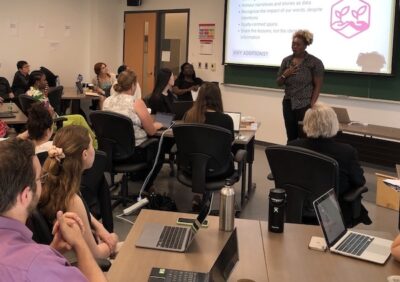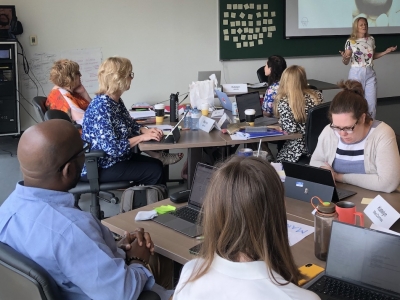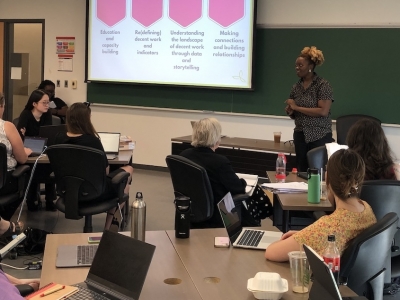Programs
Program overview
The Master of Philanthropy and Nonprofit Leadership (MPNL) program and the Graduate Diploma in Philanthropy and Nonprofit Leadership (DPNL) program offer a specialized set of knowledge, skills and peer-to-peer learning for leadership-track positions – as innovators and change-makers – in the nonprofit and philanthropic sector. The MPNL cohorts include both experienced and aspiring professionals in this field. The DPNL program is intended to enable working professionals to upgrade their knowledge and skills; students may be able to apply the DPNL credits towards the MPNL program.
The programs’ format allows students to study without needing to relocate.
Graduates are capable of critical, audacious thinking. They understand emerging trends and issues in the complex world of philanthropy and nonprofits, both nationally and globally — and they apply their knowledge to solve real-world problems. Graduates find advanced leadership positions with a wide range of nonprofits, foundations, governments, social enterprises and companies. You can read examples on the Alumni page of PANL Perspectives.
Jen Garden, a graduate student and Chapter Director for Make-A-Wish Canada, explains why the program is incredible:
Program structure
The MPNL and DPNL programs begin in the summer term with a preparatory online component starting in May (with course readings, discussion forums and some pre-assignments) followed by a two-week Summer Institute at Carleton University in the summer. The rest of the programs are completed through engaged online learning, hybrid learning (combined in-class and virtual), or intensive one-week classes, and a second Summer Institute for MPNL students. MPNL and DPNL students take classes together; the only difference between the programs is length.

Entry term for both programs: summer term.
Master’s (MPNL) program length: five terms (full time); and 10 terms (part time).
Diploma (DPNL) program length: two terms (full time); and four terms (part time).
The MPNL program consists of: seven core (required) courses; four elective courses; and a Capstone Project conducted with a community organization. Four of the core courses are taken during two Summer Institutes. The DPNL consists of two core (required) courses during the Summer Institute and four electives.
Please see the MPNL and DPNL programs and course requirements for more information.
A typical, full-time, five-term program cycle for the MPNL program might look like this:
| Summer term #1* | Fall term #1 | Winter term | Summer #2* | Fall #2 |
|---|---|---|---|---|
| 5001 Foundations of Philanthropy: during two-week Summer Institute (full days split with 5002)* | 5006 Research Methods: online | 5007 Policy & Program Evaluation: online | 5004 Governance & Leadership: during one week on campus (full days)* | 5010 Capstone Project: online, working in teams with a host community partner |
| 5002 Policy & Legal Environment: during two-week Summer Institute (full days split with 5001)* | Elective #1: Four electives required in various formats: online courses; on-campus, one-week intensives; and on-campus regular courses. | 5003 Finances for Philanthropy & Nonprofit Sector: online | 5005 Organizational Development: during one week on campus (full days following 5004)* | Remaining elective courses can be completed in this term |
| Elective #2 | Elective #3 | Elective #4 | ||
| * Usually begins in May each year with readings & pre-assignments, followed by two weeks of in-person classes, called Summer Institute, at the Carleton University campus, in Ottawa, in July (with assignments often due in late August). Note, core courses begin with the numbers ’50’. | ||||
Admissions
Carleton University’s admission requirements for the MPNL or DPNL programs provide important, general information. Further admission requirements are available on the MPNL site.
Professional Entry
Experienced professionals who have at least seven years of work experience in the philanthropic and nonprofit field during which they exhibited significant leadership and increasing levels of responsibility (and who have an undergraduate degree) may quality for Professional Entry admission. This reduces program requirements to ten courses (seven core courses and three electives, for a total of 5.0 credits). Application for Professional Entry must be completed by October 15 of a student’s first year in the program.
Mid-Career Entry
In special circumstances, mid-career applicants who don’t have an undergraduate degree but who have a minimum of five years of professional experience in the sector will be considered for admission. These candidates are considered after they demonstrate their academic potential by completing and doing very well in up to two, graduate-level courses; admission on this basis doesn’t reduce the length of the program.
The pathways of Professional Entry and Mid-Career Entry aren’t intended to be accessed together. Mid-career applicants without an undergraduate degree may not apply for Professional Entry.
Please contact us for more information: mpnl@carleton.ca.

What Do I Do with This Degree?

Summer Institute

Scholarships

Internships & Capstones
